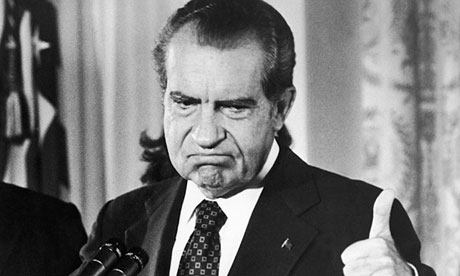On the 40th anniversary of the Watergate scandal that lead to the impeachment and resignation of President Richard Nixon, the majority of young people have delivered their verdict: not that big of a deal. Slightly over 50 percent of respondents aged 18-35 in a CNN/ORC think that the scandal was “just politics” as opposed to a “serious matter.”
For those over 35, the share that holds this opinion drops to just over 40 percent. Even this overstates the nonchalance of this demographic, since some right-wingers who were adults during the scandal view Watergate as a liberal conspiracy against President Nixon – a category distinct from what I’ll argue is the generally progressive sentiment associated with young people’s response.
So while it’s not huge, there’s clearly a generational gap when it comes to historical memory of Watergate. How can we explain that?
First of all, it’s important to clarify that Watergate was, in fact, a serious matter. The presidency of Richard Nixon was characterized by extreme repression of revolutionary and progressive forces in the United States and around the world. The genocidal Vietnam War raged and people’s leaders like Fred Hampton were being murdered in cold blood. The scandal that ended the reign of this faction of the ruling class can obviously be said to have had far-reaching, critically important consequences. The winning streak world revolutionary forces went on during the Ford and Carter administrations could in some part be attributed to the relatively rudderless situation of the flagship of world imperialism.
However, I think it makes more sense to attribute the widespread opinion that Watergate was just business as usual to general contempt for bourgeois politicians (and, to a lesser but still significant extent, the bourgeois political system as a whole). Saying that brazenly criminal activity like that involved in Watergate is not particularly surprising registers a lack of confidence in the political establishment.
As I’ve argued on this blog before, young people have had a host of formative political experiences that expose key contractions of the capitalist system. It’s clear to a comparatively large number of youth that the civics textbook version of the U.S. government is just a front.
Stuck in a wave of economic stagnation and an increasingly volatile world situation, the U.S. ruling class has been unable to build a consensus around a strategy for the future. As deadlock sets in alongside the breakdown of traditional decision-making structures, faith in the system erodes. Let’s organize so that this cynicism is turned into determination to struggle for a different world.






